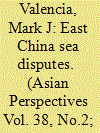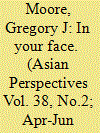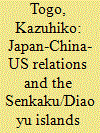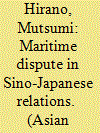| Srl | Item |
| 1 |
ID:
131261


|
|
|
|
|
| Publication |
2014.
|
| Summary/Abstract |
Developments in the East China Sea disputes in recent years appear to have set back Northeast Asian regional integration. Are there ways of turning these negative developments into more positive ones? Taking the Ecuador-Peru territorial dispute as a model, I consider the possibility of conflict transformation for the East China Sea dispute. The Ecuador-Peru border dispute was the most protracted in the Western Hemisphere, yet a peace agreement was finally reached in 1998, suggesting that even the most deeply ingrained differences and most persistent disputes can be transformed and ultimately overcome.
|
|
|
|
|
|
|
|
|
|
|
|
|
|
|
|
| 2 |
ID:
131257


|
|
|
|
|
| Publication |
2014.
|
| Summary/Abstract |
The dispute over ownership of islands, maritime boundaries, jurisdiction, perhaps as much as 100 billion barrels of oil equivalent, and other nonliving and living marine resources in the East China Sea continues to bedevil China-Japan relations. Historical and cultural factors, such as the legacy of World War II and burgeoning nationalism, are significant factors in the dispute. Indeed, the dispute seems to have become a contest between national identities. The approach to the issue has been a political dance by the two countries: one step forward, two steps back. In this article I explain the East China Sea dispute, explore its effect on China-Japan relations, and suggest ways forward.
|
|
|
|
|
|
|
|
|
|
|
|
|
|
|
|
| 3 |
ID:
131258


|
|
|
|
|
| Publication |
2014.
|
| Summary/Abstract |
While China's rising power is certainly an important variable in Sino-Japanese relations, it cannot explain either why the Diaoyu/Senkaku Islands dispute broke out anew in the fall of 2012 or why the Chinese response was so strong. China read Japan's move to nationalize the islands as an in-your-face move designed to show disrespect for China and make Japan's sovereignty over the islands a fait accompli. In this article I borrow from Robert Putnam's notion of twolevel games to argue that there are two levels of face politics going on in this case: one between domestic actors in Japan and in China, the other between the two countries. A solution to the territorial dispute can only be found when both sides' "face needs" are recognized and met at both levels of analysis.
|
|
|
|
|
|
|
|
|
|
|
|
|
|
|
|
| 4 |
ID:
131259


|
|
|
|
|
| Publication |
2014.
|
| Summary/Abstract |
In this analysis of the Senkaku/Diaoyu, including the US role, I employ the framework of Western theories of international relations (IR). The analysis turns to the prisoner's dilemma to find a possible solution to the present impasse. The key task for negotiators and IR theorists is to find an equation that satisfies three factors simultaneously: China does not enter Japan's territorial waters; Japan continues the three nos of "not to land, not to investigate, and not to build"; and confidence-building measures are instituted to avoid direct military collisions. So far, the prisoner's dilemma has not succeeded in finding that equation, so perhaps more attention should be paid to the Eastern concept of face saving or giving face, which in addition to the other three factors might enable the two sides to reach a modus vivendi.
|
|
|
|
|
|
|
|
|
|
|
|
|
|
|
|
| 5 |
ID:
131260


|
|
|
|
|
| Publication |
2014.
|
| Summary/Abstract |
My aim in this article is to shed light on some domestic dimensions of the maritime dispute between China and Japan in the East China Sea, in particular those of the Japanese side. The domestic dimensions are important because many actors are involved and the dispute is multidimensional. We may need to set longer time frames in order to find exit strategies and at least mitigate the influence of this seemingly intractable dispute. I suggest mid- to long-term alternative approaches to resolving it.
|
|
|
|
|
|
|
|
|
|
|
|
|
|
|
|
| 6 |
ID:
131262


|
|
|
|
|
| Publication |
2014.
|
| Summary/Abstract |
Recent patterns suggest that states are using economic sanctions more frequently. However, sanctions fail to achieve intended political or economic goals most of the time. To account for this anomaly, I introduce a culture-based explanation. The rationale is that sanction effectiveness cannot be solely judged by norms and standards of sender countries. Target countries' cultural norms play an important role in explaining sanction effectiveness. Using cases of US economic sanctions against China, I show that the norms and beliefs of target countries play an important role in defining sanction effectiveness. The implication of the study is that senders of economic sanctions must take cultural responses and sensitivity of targets into serious consideration in order to deploy credible and successful economic sanctions as a foreign policy tool.
|
|
|
|
|
|
|
|
|
|
|
|
|
|
|
|